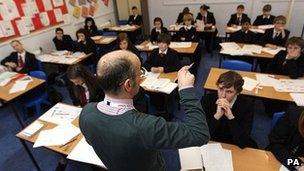Teachers' performance pay on pupil progress
- Published

Teachers' unions have been opposed to plans to extend performance pay
Pupils' progress and behaviour are to be used to assess teachers' suitability for performance pay.
Schools in England have been sent guidelines from the Department for Education on how to appraise teachers for performance pay from September.
Annual incremental increases in teachers' pay are being scrapped.
The National Union of Teachers says it "deplores" the plan and there is no evidence that performance pay will raise standards.
Teachers' pay rises have previously reflected length of service, but there will now be a stronger link between achievement and pay progression.
Rewarding teachers
The government argues that raising the quality of teaching is the key to improving results.
Performance-related measures have already been in place for teachers wanting to access higher pay scales. But this will now be applied more widely, with more flexibility over pay levels and progress linked to annual appraisals.
The first payments under the new system will be made from September 2014.
The advice from the Department for Education sets out how teachers' performance might be measured:
impact on pupil progress
impact on wider outcomes for pupils
improvements in specific elements of practice, such as behaviour management or lesson planning
impact on effectiveness of teachers or other staff
wider contribution to the work of the school.
"It is vital that schools can recruit and reward the best teachers," said a Department for Education spokesman.
The department also quotes research from the Bill and Melinda Gates Foundation in the United States which has argued that good teaching is vital to pupil achievement - and as such it is important to be able to measure what represents effective teaching.
But teachers' unions have been hostile to the changes proposed by the government, arguing that the expectation of an annual increment, in place since the 1920s, provided an incentive to recruit graduates into teaching.
They have argued that the intention is to break up national pay deals and cut spending on teachers' pay.
A campaign of industrial action against changes to teachers' pay and pensions has already been announced.
"Performance-related pay is increasingly discredited elsewhere as a means of motivating employees and there has never been any evidence that it motivates teachers or improves their performance," said NUT general secretary, Christine Blower.
"These changes could deter graduates from entering teaching, restrict serving teachers' ability to move jobs and cause many to leave teaching if they are unfairly deprived of pay progression by decisions which ignore their contribution to their school but focus instead on funding pressure or whether the teacher's face fits."
Chris Keates, head of the NASUWT teachers' union, said the changes to pay would "heap further misery onto teachers".
"The inconvenient truth is that the coalition government's real aim is to reduce teachers' pay in order to maximise the opportunities for schools to be run for profit, damaging children's education into the bargain," she said.
Mary Bousted, leader of the ATL teachers' union, attacked the pay plans as a "bureaucratic nightmare, packed with management speak".
But the National Association of Head Teachers says it will publish a model pay policy which will help schools implement performance pay in a structured way, without an "immediate free for all".
The union's general secretary, Russell Hobby, said schools could use the greater flexibility while "avoiding the risks".
"We see little value in departing from the pay points or experimenting with pay grades at this time. We see a lot of value in performance-related progression and this should be the focus of schools for the next couple of years," said Mr Hobby.
- Published30 March 2013
- Published26 March 2013
- Published5 December 2012